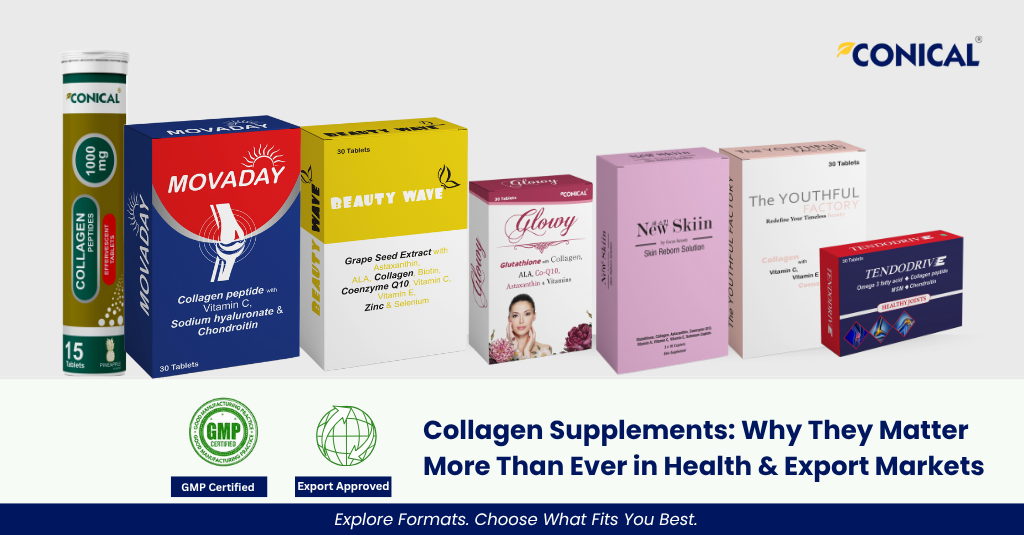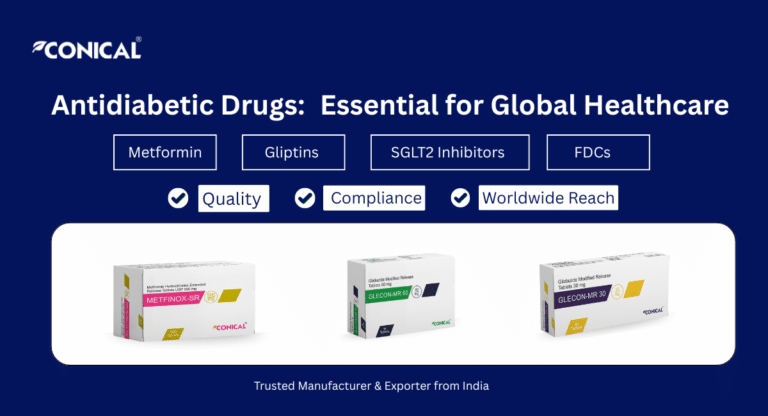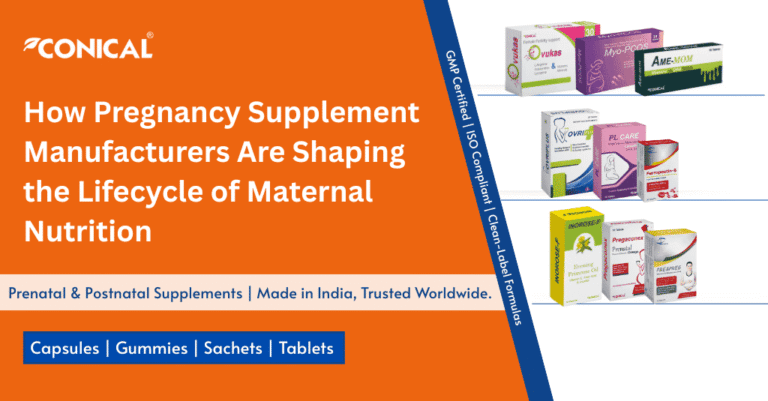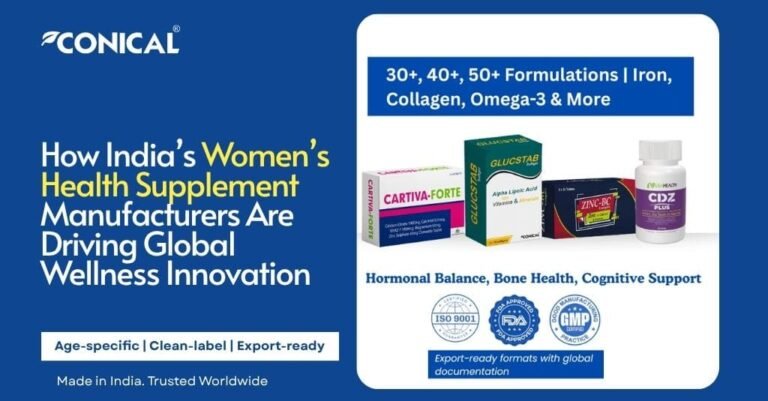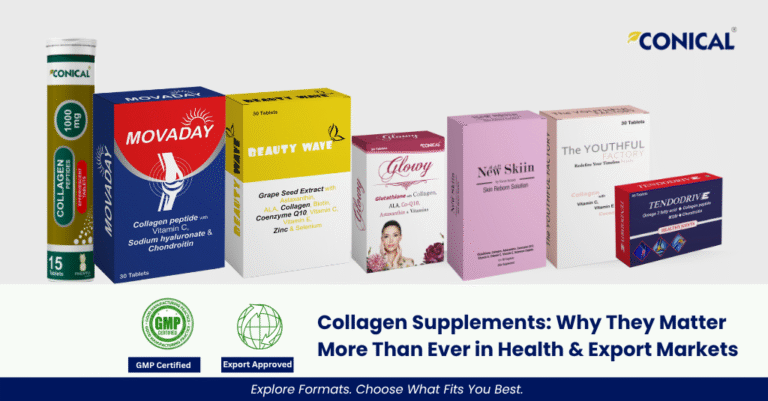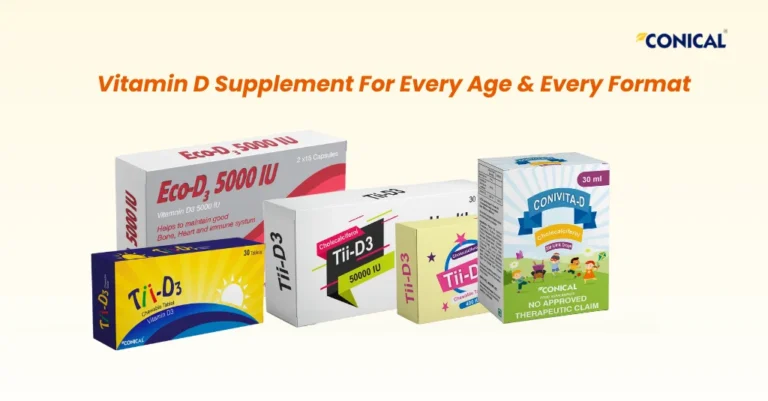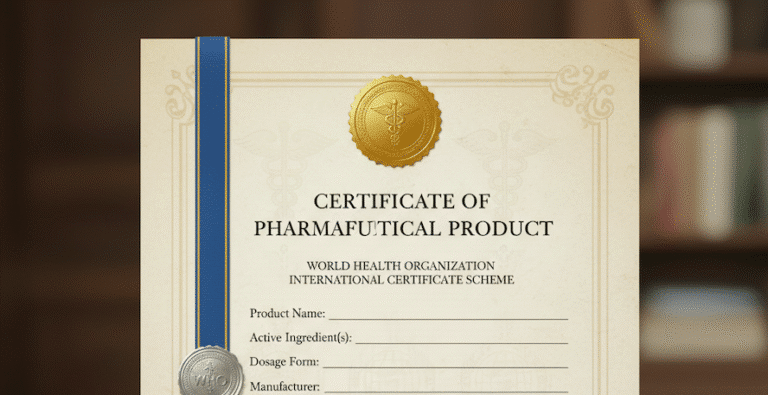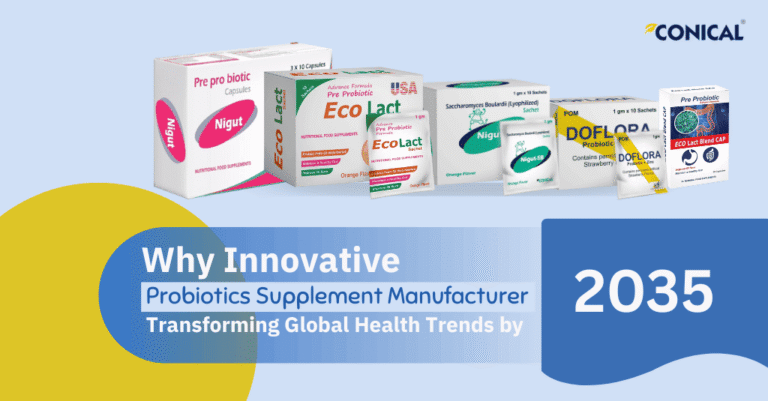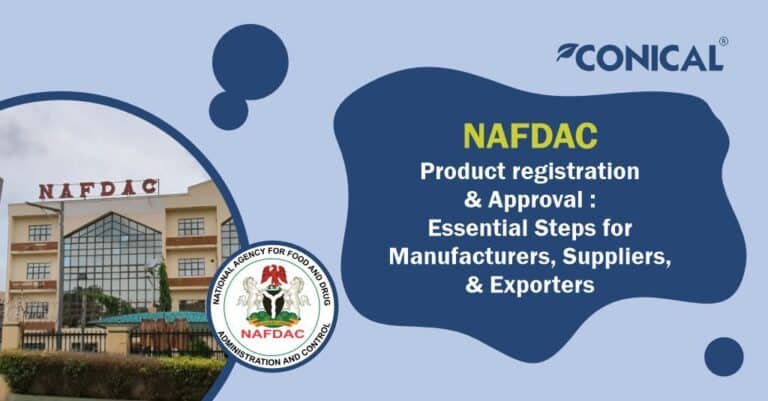As a leading collagen dietary supplement manufacturer in India, staying ahead of global trends is no longer optional but it’s essential. Collagen dietary supplements have become a cornerstone of modern wellness, supporting skin, joints, hair, and muscle health across life stages. From powders and gummies to capsules and effervescent tablets, manufacturers must align with market-specific formats, certifications, and consumer preferences to succeed. This blog guide explores everything from sourcing and labeling to B2B engagement and regulatory compliance, helping manufacturers deliver trusted, export-ready collagen dietary supplements to buyers worldwide.
What Is a Collagen Dietary Supplement?
A collagen Dietary supplement is a dietary product that delivers hydrolyzed collagen peptides or a native collagen supplement to support the body’s natural repair and regeneration processes. These supplements are typically derived from:
- Marine sources (fish skin/scales)
- Bovine sources (cowhide/bones)
- Porcine sources (pig skin)
- Vegan collagen boosters (support collagen synthesis, not actual collagen)
Where Can You Get Collagen Dietary Supplements?
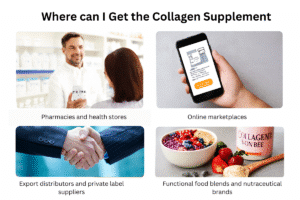
- Pharmacies and health stores.
- Online marketplaces.
- Export distributors and private label suppliers.
- Functional food blends and nutraceutical brands.
What are the benefits of taking collagen dietary supplements?
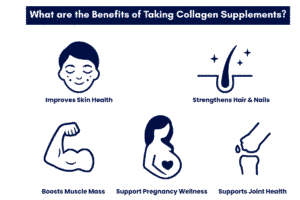
Collagen Dietary Supplements for Skin
Collagen helps maintain skin hydration, elasticity, and firmness. Supplementation can reduce signs of aging, including:
- Fine lines
- Wrinkles
- Sagging skin
- Dryness
- Check here collagen dietary supplement for skin
Collagen Dietary Supplement for Hair
Collagen provides amino acids like proline and glycine, which are essential for keratin production. Benefits include:
- Stronger hair strands
- Reduced breakage
- Improved scalp health
- check here collagen supplement for hair
Collagen Dietary Supplement for Joints
Type II collagen is found in cartilage. Supplementing may:
- Reduce joint pain and stiffness.
- Improve mobility
- Support athletes and aging adults
- check here collagen supplement for joint health
Collagen Dietary Supplement for Muscle
Collagen supports muscle regeneration and may help increase lean muscle mass, especially in older adults or during post-injury recovery.
Collagen Dietary Supplements in Pregnancy
While collagen is generally safe, pregnant women should consult their healthcare provider. Potential benefits include:
- Skin elasticity during pregnancy
- Joint support
- Hair and nail strength
Different types of collagen supplement formats
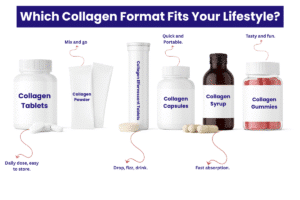
| Dosage Form | Description | Ideal For |
| Tablets | Easy to dose; often combined with vitamins | Daily wellness, travel-friendly |
| Powder Sachets | Mixable with water or smoothies | Beauty blends, fitness routines |
| Effervescent Tablets | Dissolvable in water; fast absorption | Hydration-focused consumers |
| Capsules | Convenient and tasteless | General consumers |
| Liquid Collagen | High bioavailability; flavored options | Anti-aging and joint support |
| Gummies | Tasty and chewable | Youthful skin and hair formulas |
Global B2B Trends for Collagen Dietary supplement Formats Preferred by Importers and Retailers in 2025.
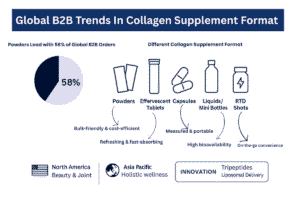
- Top Formats: Powders (around 58% share), effervescent tablets, capsules, gummies, liquids/mini bottles, and ready-to-drink shots are dominating 2025 B2B orders.
- Key Drivers for Buyers:
- Powders are preferred for bulk, flexible dosing, and cost efficiency, making them ideal for fitness chains and bulk wellness buyers.
- Gummies and liquids are rising in popularity for retail-ready export, driven by taste, convenience, and new consumer segments.
- Capsules attract buyers needing measured, portable doses, especially for e-commerce and pharmacy channels.
- Innovation: Importers demand clinically validated, multi-format portfolios brands offering enhanced absorption tech (e.g., tripeptides, liposomal delivery) and subscription-ready packaging win more B2B contracts.
- Regional Focus: North America leads in beauty/joint claims; Asia Pacific buyers prefer ‘holistic wellness’ formats.
How to Choose the Best collagen Dietary supplement Dosage Form: Capsules vs. Gummies
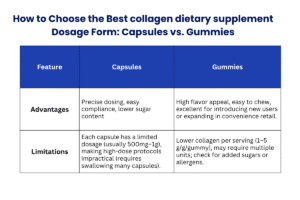
- Capsules: Suited for importers targeting pharmacies or professional sports buyers
- Advantages: Precise dosing, easy compliance, lower sugar content
- Limitations: Each capsule has a limited dosage (usually 500 mg–1 g), making high-dose protocols impractical (requires swallowing many capsules).
- Gummies: Retailers prefer gummies for mass-market and lifestyle consumers.
- Advantages: High flavor appeal, easy to chew, excellent for introducing new users or expanding in convenience retail.
- Limitations: Lower collagen per serving (1–5 g/g/gummy), may require multiple units; check for added sugars or allergens.
- Buyer Tip: For bulk export, capsules suit clinical and pharmacy channels; gummies excel in fast-moving retail and emerging convenience categories. Product quality and clear labeling matter more than format.
Regulatory Checklist for Collagen Dietary Supplement Exports. Here are 5 common problems & their solutions.
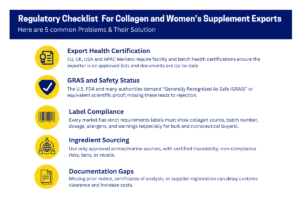
- Export Health Certification: EU, UK, USA, and APAC markets require facility and batch health certifications—ensure the exporter is on approved lists and documents are up to date.
- GRAS and Safety Status: The U.S. FDA and many authorities demand “Generally Recognized As Safe (GRAS)” or equivalent scientific proof; missing these leads to rejection.
- Label Compliance: Every market has strict requirements—labels must show collagen source, batch number, dosage, allergens, and warnings (especially for bulk and nutraceutical buyers).
- Ingredient Sourcing: Use only approved animal/marine sources, with certified traceability; non-compliance risks, bans, or recalls.
- Documentation Gaps: Missing prior notice, certificates of analysis, or supplier registration can delay customs clearance and increase costs.
Solution: Always work with a customs broker and maintain real-time batch traceability; use digital systems to generate compliant export documentation and labels for every shipment.
Bulk Sourcing Guide for Collagen Dietary supplement: Packaging, Stability, and Labeling for International Distributors
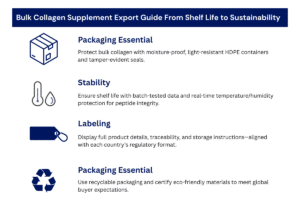
- Packaging Essentials: Bulk collagen must use moisture-proof, light-resistant containers; barrier packaging with HDPE bottles or pouches and tamper-evident seals are standard for exporters.
- Stability: Batch-tested for shelf life; manufacturers need to provide real-time temperature/humidity stability data and protect peptides from degradation.
- Labeling: Labels on bulk must specify the product name, net weight, batch number, production/expiration dates, lot traceability, and clear storage instructions, plus comply with each destination country’s language and regulatory template.
- Sustainability: Buyers increasingly request recyclable packaging and proof of eco-friendly materials on bulk orders.
Checklist/Download: What Every Import Manager Needs for Smooth Collagen Dietary Supplement Imports
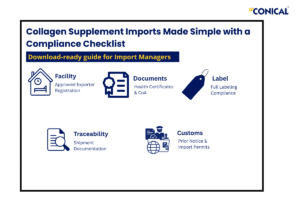
- Approved exporter facility listing or registration with the destination health authority.
- Complete health certificates, Certificate of Analysis (CoA), and safety documentation for each batch
- Full labeling compliance: clear source (bovine/marine/porcine), nutrition facts, allergens, and handling instructions on bulk and retail-ready packs.
- Traceability documentation (digital or paper) for every shipment.
- Customs prior notice and import permits were required.
Pro Tip: Import managers should set up a repeat checklist and digital signage review for every new supplier or product launch to prevent compliance failures and shipping delays.
Successful Entry for Collagen dietary Supplement: Key Expansion Strategies.
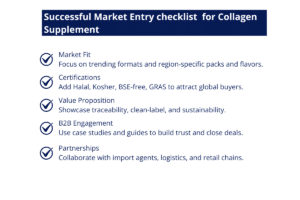
- Market Fit: Prioritize trending formats (powder, gummies, capsules, and effervescent tablets) in targeted geographies; offer region-relevant pack sizes and flavors.
- Certifications: Add market-specific certifications, e.g., Halal/Kosher, BSE-free, and GRAS, to attract global buyers, especially for the Middle East and Europe.
- Value Proposition: Highlight supply chain traceability, clean-label, and sustainability stories in export collateral.
- B2B Engagement: Use case studies, documentation downloads, and regulatory guides as lead magnets to win distributor trust and speed up contract closure.
- Partnerships: Seek alliances with local import agents, logistics firms, and retail chains for faster channel entry and compliance.
What are the benefits of Collagen Peptides
Short-chain amino acids obtained from hydrolyzed collagen are known as collagen peptides. They may provide the following advantages when regularly consumed:
- increased hydration and elasticity of the skin help to minimize dryness and wrinkles by promoting the natural production of collagen.
- Support for the joints and less stiffness may increase mobility and lessen osteoarthritis symptoms.
- Stronger nails and hair lessen brittleness and encourage growth.
- Increased muscle mass and recuperation promote the growth of lean muscles, particularly when paired with resistance training.
- Support for bone density may support bone health, particularly in older adults.
Reference From:
https://www.mordorintelligence.com

